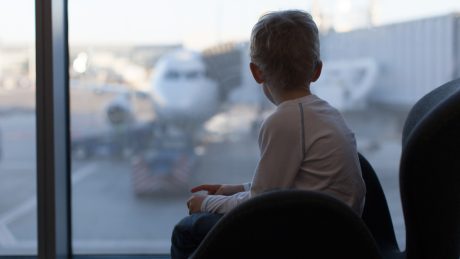With the latest UK lockdown in place and no end in sight, we explore the options available to separated parents trying to navigate co-parenting, particularly parents based in different countries. With forward planning proving difficult with ever-changing restrictions and requirements, Associate Lydia Fowler and Partner Sam Longworth set out some guidance to assist parents during this period of uncertainty.
It is not the start to 2021 anyone had hoped for. The latest lockdown has brought the pressures of homeschooling on parents once again, along with a myriad of other challenges. For separated parents, there is the added complexity of trying to decipher government guidance nationally and internationally in order to make and facilitate contact arrangements.
We set out below the current government guidelines in England, and the essential checklist parents should consider before their child travels internationally.
What are the current restrictions in England?
The government guidelines for England (guidelines for Scotland, Wales and Northern Ireland may differ) were last officially updated on 5 January 2021, although further requirements have since been rolled out regarding travel. The guidance states that where parents do not live in the same household, existing arrangements for contact between parents and children can continue. This constitutes a legally permitted reason to leave home and for international travel. If a child’s primary residence is outside the UK, they are also permitted to return home.
In light of the above, any arrangements agreed between co-parents or provided in a Child Arrangements Order (“CAO”) should continue where reasonable and safe to do so. The President of the Family Division issued formal guidance on complying with CAOs on 24 March 2020, which is still effective. He made clear that while children can move between households, that does not mean they must do so. Parents must make a sensible assessment of the circumstances and act reasonably and sensibly to determine arrangements for their children.
On 8 January 2021, a new requirement was announced that obliges anyone entering the UK to provide a negative Covid-19 test taken not more than 72 hours before travel. Formal government guidance is yet to be published, but it has been reported that children under 11, flight crews and those travelling from countries without the infrastructure available to deliver the tests will be exempt.
What are the restrictions internationally?
Each country has its own rules, requirements and restrictions that are, like ours, regularly changing. The UK government tries to keep its Foreign Travel Advice as updated as possible, so this can be used as a solid reference point for international travel guidance.
Where possible, it is best to ask the parent residing abroad to keep up to date with their local news as it can indicate whether a change in their national rules is imminent.
If my child is not going to travel abroad, what do I do regarding contact arrangement orders?
- Agreement: CAOs can be varied, and either party to the original CAO can apply to court to vary it. The courts are trying to deal with as many applications as possible. However, since the pandemic began, the number of matters before the Family Court has remained very high, with a high volume of new applications being made throughout the year, and applications may not proceed as quickly as needed. Parents do not necessarily need to vary an order for temporary arrangements; an agreement can be reached between the parents instead. In cases where this is not possible, the court is available to those who need it. Any agreement to vary the arrangements of a court order, even as a one-off, should be done in writing.
Warning: if one parent unilaterally changes the terms of the CAO, a court may retrospectively review whether the decision made was reasonable and sensible in light of government advice at the time. - Alternatives: if a child is not going to travel to see a parent, thought should be given to alternative arrangements to facilitate indirect contact. The court will expect this. Primarily, parents can enable indirect contact by telephone and video calls. Where reasonable to do so, international parents can also consider travelling to see the child.
- Routine: children of all ages have experienced a lot of uncertainty over the last 12 months, and the third lockdown has added to this. If a child is not going to travel abroad as usual or as per a CAO, it is important, particularly for younger children, to keep some form of routine in place for whatever method of replacement contact is adopted, for example, video calls in the morning and evening at set times. This provides some stability and security for children, offers a level of control for the child and parent, and is something both can look forward to.
If my child is going to travel abroad, what do I do?
What is in the child’s best interest should be at the forefront of parents’ minds and should be continually assessed. Parents with any concerns about international travel should seek legal advice, if possible.
If a child is going to travel, the below should be considered beforehand:
- Agreement: as above, if you agree arrangements that vary an order in any way it is best to have this in writing.
- Entry: check the international rules for entry in the country the child is travelling to. Many countries now request that anyone entering from the UK must present a negative Covid-19 test by way of a PCR test certificate, (also known as a “fit to fly” certificate). There may be exemptions to this requirement, (such as children under a certain age), but, if required, your child should not travel to the airport without receiving their negative test result. If a child demonstrates any symptoms of Covid-19 or has been exposed to someone with Covid-19 before travel, then travel should be reconsidered.
- Isolation: consider whether your child will need to isolate on arrival in the country they are travelling to, and ensure that the parent receiving the child has made necessary arrangements for this. This needs to be considered in relation to the length of the child’s trip, and what is in the child’s best interest.
- Facilities: now that education has moved to online learning again, any child travelling between homes needs adequate facilities so that they can complete their home-schooling. Many children have devices that can travel with them but check with the school what books and materials they might need for the period they will be away.
- Return: ensure there are adequate arrangements in place for your child’s return. Return flights should be booked in advance, where possible. Following the UK’s impending requirement for a negative Covid-19 test upon arrival into the country, a PCR Covid-19 test should be booked for 24-72 hours before the child’s return flight. If possible, this should be booked in advance of your child’s outbound journey.
- Flights: bear in mind that flights are being cancelled regularly, so plan ahead. If your child is due to spend half term abroad, it is worth agreeing with your co-parent that your child returns earlier than usual to create a buffer if there are travel issues.
Warning: over the coming weeks, there is no guarantee that any international flights will be running. This is a risk that will have to be assessed closer to the date of travel. - Brexit: do not forget about Brexit. If you have any concern about your child’s return to the UK, they should not travel without first seeking legal advice.
Partner, Sam Longworth has the following advice:
“This is a time for flexibility and as much co-operation between parents as is feasibly possible. If direct communication is hard (or impossible), seek that co-operation through solicitors or mediators ie whatever it takes to get there. The last thing children need at this point is added anxiety about the time they will be spending with each parent. With the uncertainties that can come with the shifting sands of regulations and lockdowns, it is helpful (and comforting) for them to know that there is a plan in place and that they don’t need to worry about it. However difficult a breakup has been, this is an aim that is almost always achievable.
“While every situation is different, the advice I am giving to clients is that realistic expectations are key for international travel over the months ahead. No arrangements, court ordered or otherwise, with regards to children travelling internationally, can be said to be written in stone while the world is dealing with the ever-changing environment, and risk profile, of the Covid-19 pandemic.”
International Co-parenting during the pandemic – Times Radio
On Friday 9 April, Jenny Duggan spoke to Times Radio in a segment they did about families separated across borders due to the pandemic. Jenny spoke to Manveen Rana about how parents can co-parent productively internationally in the short term and what legal options are available to families.
On whether Stewarts and Jenny are seeing lots of these international co-parenting cases, Jenny said “We are having a lot of these cases coming through, but in some ways, the issues that are coming up are not so different as pre-pandemic.
“What really comes to mind are these cases called leave to remove. That is where a parent may want to move abroad with their children but the other parent won’t agree to that, and it is such a binary issue that you do sometimes have to ask the court to decide.
“What is really different with the pandemic and you have been touching upon it earlier, is that there are these situations where parents are separated from their children and it’s not because of a conflict between the parents, they may be co-parenting really well, but it’s just a function of the regulations.”
On what we are able to do to help people in these situations, Jenny said “In terms of helping them it relates to how to do they co-parent during a pandemic, what are they going to do. On that point I would say that some of the advice that you would give is very similar to the advice you would have given pre-pandemic or post-pandemic. It’s looking at everything really through what’s in the best interests of the children, which has to be paramount.
“There are two practical areas I touch upon and that is keeping all of your communications with the other parent as clear and calm as you can, so that might mean you pause before you send a message, or you might write a no send message. What you really do not want to do is send anything that will raise the temperature or that you might regret sending. There are parenting apps where you type in your message and it has a tone scanner to say that its really not a good idea to send this message. Its so helpful and it also takes it off the Whatsapp platform which can get completely out of control.
“At the moment, also, resilience is low and we aren’t all acting in the way we would normally. So advice is to really concentrate on not embroiling the children in what are adult issues around disagreements on time spent with them, as you really need to keep children as far away from any conflict, to allow them to be children. Touching on the pandemic, its really noticeable how people’s resilience has eroded, they are navigating what has been a horrific year, it’s taken an enormous toll on people’s mental health. Try to have in mind the experience of the other parent in that context. That might mean that you are a bit more flexible than you would normally be, within reason.
“Practical advice, if you can’t see your children at the moment, make sure that the indirect contact you have with them is regular. And try to be a little more creative, so when you are having your regular Zoom calls, try to make it fun. Maybe you can paint together or have a regular film night, to make it engaging.”
On how parents can make that experience more real and how to sort of parent from afar, Jenny said “I think having regularity is really important and I think it can allow you to keep your family held in your mind, even if they’re not physically with you. That might not just be with your immediate parent, sometimes having the family altogether at a specific time once a week, film nights I think I might really well with that. Your interactions might not be huge but almost knowing all in the same place around the world doing the same thing is psychologically very beneficial I think.
“Are there sort of legal reasons can people apply further the ability to travel to see, you know, a partner we’re parent you know are there exemptions that you can apply for.
“To say that this is a kaleidoscope of regulations, that’s incredibly difficult to navigate is a real understatement. If you look at the regulation within this country, if there are children living in more than one location there is element to be able to move freely between those households, and there are these childcare bubbles that can help for extended family. But there are limitations because that’s for children under 14, and they’re encouraged to be very local.
“In terms of travel outside of the UK, it’s really worth examining their if there are any exceptions that apply to you. There are some reasonable excuses that can be relied upon. One I’ve noticed is what is termed ‘travel in order to exorcise custody rights’. There is then the question of ‘do you have a custody right’, so it’s not that straightforward.
“And then travelling into UK there are also exemptions, but there are also quarantine restrictions. There is a recent case through the high court about a child called K (anonymised). What was touched upon here was whether or not the child could be seen to be sharing the Mother’s household. So was there a reason to essentially break the quarantine and they touch with other legal obligations you can rely upon to break quarantine and whether to comply with a contact order would be reasonable excuse or does it have to be termed lives with order where you’re living with that child as well.
“So as you can tell it’s the courts haven’t even always kind of been able fully to work it out, but some cases I’ve seen, particularly last year when the regulations are a little bit different, the court may order if a negative Covid test comes back then some contact can take place. It can be quite fact-specific, but it is worth having a very good read through the government website as there may be some advice you haven’t thought of.”
You can find further information regarding our expertise, experience and team on our Divorce and Family pages.
If you require assistance from our team, please contact us or alternatively request a call back from one of our lawyers by submitting this form.
Subscribe – In order to receive our news straight to your inbox, subscribe here. Our newsletters are sent no more than once a month.








